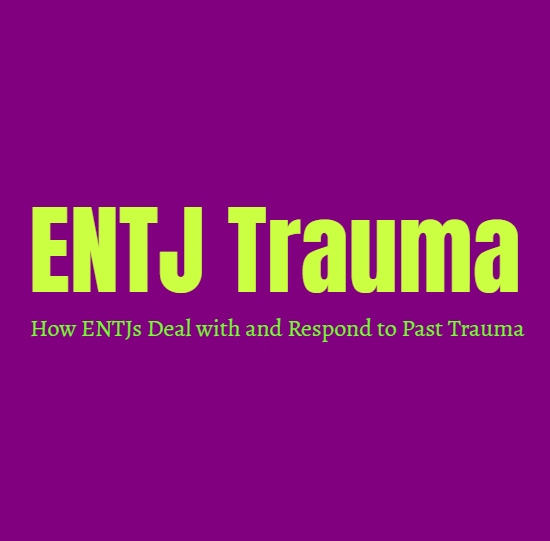ENTJ Trauma: How ENTJs Deal with and Respond to Past Trauma
When it comes to experiencing trauma, everyone has their own ways of handling and coping with what they go through. Of course, it often requires certain help from others, and serious trauma can also require therapy to find tools and ways to move through it. There are so many different types of trauma. Some happen so subtly that we don’t even realize we have endured a truly traumatic experience. It can be difficult to process, especially when you are still involved in the trauma which is bringing you down. This is something that can affect someone’s behavior long-term and make certain personality types behave in ways that don’t seem to really fit who they normally are. This is why it is important to understand the different ways that trauma can change someone or alter their behavior.
When it comes to trauma and experiences ENTJs often try to approach things from a logical point of view, which can be both good and bad at times. ENTJs don’t focus much on emotions, and this can make it challenging to recognize when certain trauma is actually affecting them. The ENTJ might neglect this because they aren’t consciously aware that something is actually bothering them. ENTJs believe in personal growth and want to be able to better themselves, so if they recognize certain behavior holding them back, they might start to dive deeper into this trauma. They try to research and learn about healthy coping mechanisms and will want to be capable of overcoming whatever they are going through. The struggle for the ENTJ can sometimes be in accepting their emotions and in trying to dive into them in order to heal.
ENTJ Childhood Trauma
The ENTJ who has endured trauma from a young age is likely to struggle with trusting people. While trust is often something that takes time for ENTJs ordinarily, it can make this even harder for them when they have gone through childhood trauma. They want to avoid being rejected or allowing anyone to see them as vulnerable since they experience a lack of trust toward most people. They don’t want to feel alienated since ENTJs naturally crave having people around them who are loyal and committed. The struggle is that enduring trauma during their childhood can set the ENTJ for feeling like people just can’t be there for them in the way they need. Instead of letting anyone in, the ENTJ is likely very closed off and might even put people through a lot of tests and trials before trusting them at all. This comes from that unresolved trauma and feeling like they want to avoid getting hurt in ways that could be damaging. ENTJs tend to act as if they are not affected by trauma or anything that stands in their way, but that doesn’t mean they don’t still feel things deeply and experience pain from what they have been through.
How Trauma Changes The ENTJ
The ENTJ who has endured some trauma can find themselves struggling to process their emotions in healthy ways. If they don’t deal with the trauma, it can start to fester, and the ENTJ might become more emotionally reactive. Simply burying those emotions doesn’t make them go away, so without taking the appropriate time to work through all of it, they can snap easily on people. Their feelings are likely to come out in strange situations and times since the ENTJ has spent so much time trying to push them aside. They might have a strong reaction to something they would otherwise have been calmer and more collected about, and it doesn’t always make sense to them or those around them. This is something that often comes from that trauma, and the ENTJs neglect of the feelings attached to it. This can also cause the ENTJ to distance themselves from others, especially if they continue to let this trauma fester for a long time. Holding onto those feelings can make the ENTJ feel like being alone when ordinarily they would enjoy connecting with people and are rather social people. They can act as if they don’t care or aren’t bothered by it, but it is likely that they are simply not processing what they are going through.
ENTJ Coping with Trauma
For the ENTJ, coping with trauma can be something they struggle with when they are younger, especially before they have matured their weaker functions. At first, they can adopt a mentality that they can simply override this trauma and push past it instead of dealing with it directly. When the ENTJ does this, they find themselves avoiding those feelings and likely have them pop up later down the line in less-than-ideal ways. The ENTJ, who is willing to take on their trauma instead of avoiding it, is definitely capable of overcoming it and moving forward. When they take the time to really accept and process what has happened to them, then they can find ways to heal and grow from it. ENTJs might not focus a lot on the emotional aspect of it, but they can logically see how they have to face those feelings to some extent if they want to progress at all. Seeking professional help can be useful for anyone suffering from trauma, and for the ENTJ seeking out someone with experience in understanding in a professional capacity can be helpful. They are good at researching and learning how to improve themselves, and so this is something that can help them cope with their trauma. What they need is to take the time to process what is going on and use the information they gather in order to truly understand themselves and their experiences better. ENTJs are capable people, especially when they start to work on their inferior function and learn how to self-reflect a bit more.
This Post is Brought To You By BetterHelp
